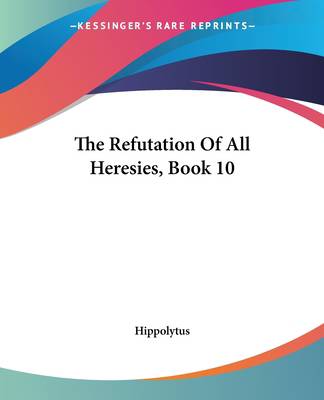
- Retrait gratuit dans votre magasin Club
- 7.000.000 titres dans notre catalogue
- Payer en toute sécurité
- Toujours un magasin près de chez vous
- Retrait gratuit dans votre magasin Club
- 7.000.0000 titres dans notre catalogue
- Payer en toute sécurité
- Toujours un magasin près de chez vous
Description
The Refutation of All Heresies, Book 10 is a historical and theological text written by Hippolytus, a Christian theologian and bishop who lived in the 3rd century AD. The book is part of a larger work that aims to refute various heresies and false teachings that were prevalent in the early Christian Church. In Book 10, Hippolytus focuses on the teachings of a group called the Naassenes, who were a Gnostic sect that believed in a complex system of divine emanations and mystical rituals. Hippolytus critiques their beliefs and practices, arguing that they are not in line with orthodox Christian doctrine. The book is divided into chapters that each address a specific aspect of Naassene theology, such as their beliefs about the nature of God, the creation of the world, and the role of human beings in the universe. Hippolytus draws on a variety of sources, including the Bible, other early Christian writings, and philosophical texts, to make his arguments. Overall, The Refutation of All Heresies, Book 10 provides valuable insights into the theological debates and controversies that shaped early Christianity. It is a significant work of Christian history and theology that continues to be studied and debated by scholars today.Now the Docetae advance assertions of this description: that the primal Deity is as a seed of the fig-tree; and that from this proceeded three AEons as the stem, and the leaves and the fruit; and that these projected thirty AEons, each (of them) ten; and that they were all united in decades, but differed only in positions, as some were before others. And (the Docetae assert) that infinite AEons were indefinitely projected, and that all these were hermaphrodites. And (they say) that these AEons formed a design of simultaneously going together into one AEon, and that from this the intermediate AEon and from the Virgin Mary they begot a Saviour of all.This scarce antiquarian book is a facsimile reprint of the old original and may contain some imperfections such as library marks and notations. Because we believe this work is culturally important, we have made it available as part of our commitment for protecting, preserving, and promoting the world's literature in affordable, high quality, modern editions, that are true to their original work.
Spécifications
Parties prenantes
- Auteur(s) :
- Editeur:
Contenu
- Nombre de pages :
- 48
- Langue:
- Anglais
Caractéristiques
- EAN:
- 9781419180170
- Date de parution :
- 17-06-04
- Format:
- Livre broché
- Format numérique:
- Trade paperback (VS)
- Dimensions :
- 190 mm x 233 mm
- Poids :
- 113 g

Les avis
Nous publions uniquement les avis qui respectent les conditions requises. Consultez nos conditions pour les avis.






